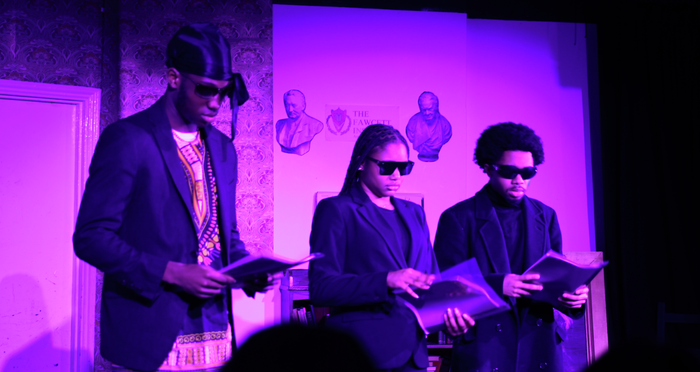Orpheus in the Underworld soars
Orpheus in the Underworld: an operatic masterclass executed with the endearing awkwardness and sonar superiority of the Cambridge University Opera Society

Offenbach’s ‘Orpheus in the Underworld’ sees the legend of Orpheus and Eurydice translated to a vibrant, comic romp, with a winning score and libretto. Whilst unpolished in places, CUOS’s version - directed by Max Mason, music directed by Sam Gray - fully captured the opera’s playful essence.
The show started strong. Hugo Williamson and Sumei Bao-Smith played Orpheus and Eurydice’s marital frustration very well, delivering their duet (‘Ah! C’est ainsi! ’) with both vocal and comic virtuosity. Bao-Smith’s voice, both silken smooth and intensely characterful, is remarkable; the audience genuinely sat up straighter in her (thankfully multiple) arias. My only qualm with Williamson was that, for an opera named after his character, he was not in it more; Orpheus effectively exits the action about halfway through Act One. Given his stand-out performance up to that point - endearing awkwardness and an edge of pomp, combined with impressive vocal agility - this was a shame.
Thankfully, there was a lot else to like. Tom Unwin’s set was slickly transformed from a shepherd’s hut to the heights of heaven; it looked as if the Gods were walking on clouds. The costuming could have been improved (there were a few rogue pairs of jeans) and the Care Bears were a slightly random prop, but this was not to the detriment of the overall aesthetic. And the orchestra were flawless; from the overture onwards, they did absolute justice to Offenbach’s score. There were, though, a couple of balance issues with quieter cast members, a challenge of the West Road stage.
“Whilst unpolished in places, CUOS’s version - directed by Max Mason, music directed by Sam Gray - fully captured the opera’s playful essence.”
The rest of the principal cast shone, and I was struck by just how funny Offenbach’s writing can be. In his first song as Pluto, Liam Lichy-Lightman cleverly inflected the word ‘ah’ to fit dozens of different senses, and Unwin was formidably entertaining as Jupiter. It is worth going to see ‘Orpheus’ for his bug-like - as ‘buzz buzz’ bug-like - seduction of Eurydice alone. Helena Paish - stately and formidable - rose to the challenging, metatheatrical role of Public Opinion, and I enjoyed Garbhan McEnoy’s chipper portrayal of Mercury. Surprisingly show-stealing, though, was Elliot Harding-Smith as Jupiter’s drunken servant, John Styx. His delivery of ‘King of Boeotia’ was laddish and sardonic in a way that absolutely should not have worked in an Offenbach opera, but was weirdly spot on.
The chorus, on one hand, were led with genuine excellence by Diana, Cupid, Venus, Juno and Minerva (Maggie Tam, Anna Williams, Mary Cotton, Gabrielle Desalbres, Jessica Folwell), who gave stunning vocal performances, and were reassuringly polished choreographically. On the other, though, the rest had very little to do. The default seemed to be ‘chorus stands at the back and reacts’, which became repetitive and crowded the stage. Whilst they sung well - the articulation, in all parts, was spot on - a profound lack of blocking meant that they often seemed at a loss. And as much as simple choreography is often the most effective for large chorus groups, their movements, when they had any, were painfully basic.
“It is worth going to see ‘Orpheus’ for his bug-like - as ‘buzz buzz’ bug-like - seduction of Eurydice alone.”
In fairness, though, when the chorus were involved their enjoyment was palpable. The party scene in Act Two prompted some spectacular drunk acting, and the Can-Can in the finale - by far Offenbach’s most famous number - was suitably energetic. Credit here to Mars (Peter Coleman), whose vivacious high kicks sent me into a painful fit of giggles, much to the dismay of the ‘serious’ opera enthusiast sitting in front of me. I have no regrets; ‘Orpheus in the Underworld’ is a delightfully silly show, and should be appreciated as such.
Orpheus in the Underworld is showing at the West Road Concert Hall until Saturday 24th February 2024.
 Interviews / You don’t need to peak at Cambridge, says Robin Harding31 December 2025
Interviews / You don’t need to peak at Cambridge, says Robin Harding31 December 2025 Comment / What happened to men at Cambridge?31 December 2025
Comment / What happened to men at Cambridge?31 December 2025 News / Unions protest handling of redundancies at Epidemiology Unit30 December 2025
News / Unions protest handling of redundancies at Epidemiology Unit30 December 2025 News / Varsity’s biggest stories of 202531 December 2025
News / Varsity’s biggest stories of 202531 December 2025 News / Downing investigates ‘mysterious’ underground burial vault 29 December 2025
News / Downing investigates ‘mysterious’ underground burial vault 29 December 2025










